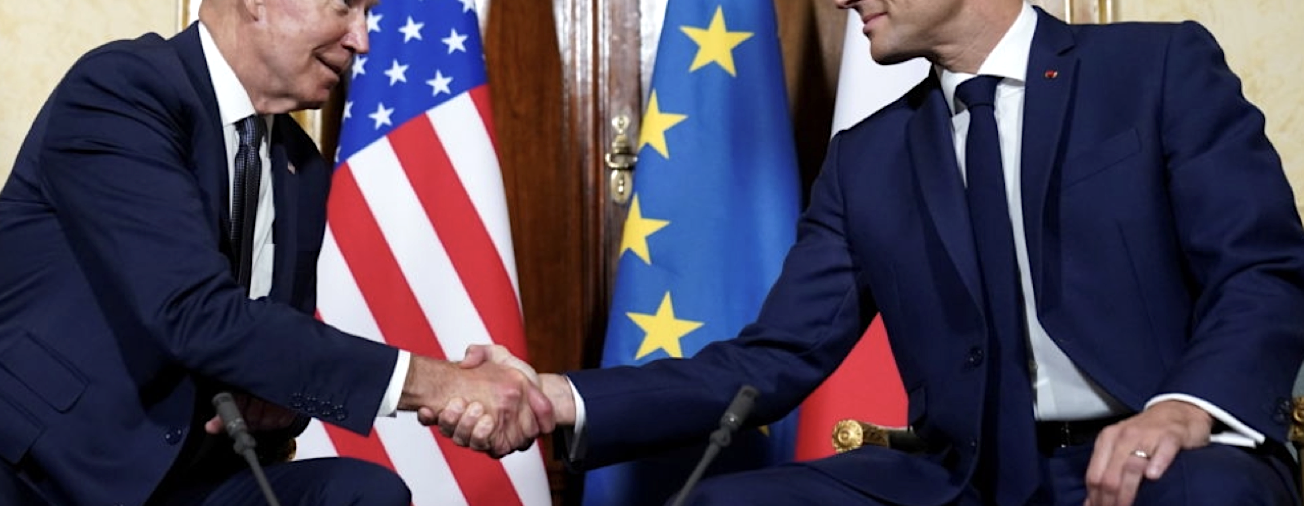The pushback that the Inflation Reduction Act is getting from European Union member states seems to be increasing. In early November, the 27 EU nations agreed that the incentives posed by the IRA could damage its economies—a concern that was echoed by South Korea. We believe that Germany is leading the charge to tweak the legislation given that German cars account for ~10% of light vehicle sales within the US each year and demand for those cars will face a headwind.
In a recent visit to Washington, French president Emmanuel Macron called on Congress and President Biden to amend the IRA considering that its $370B incentives for renewable energy and EV manufacturing within the US pose a risk to the economies of European nations.
The Inflation Reduction Act
Seven years ago, China crafted a ten-year strategy for technological innovation and promotion of Chinese manufacturers. The strategy was called Made in China 2025 and it offered state funding, low-interest loans, and tax breaks to catalyze the growth of China-based companies. This playbook was the framework used by Congress for the Inflation Reduction Act.
As a recap, the bill allocates loans and tax credits toward clean energy efforts starting with support for US-based EV production, assembly of wind and solar components, and the processing of battery-critical minerals. The headline incentive is the Clean Vehicle Credit, which gives a $7,500 tax credit if the following criteria are met:
- A $3,750 credit if the vehicle has battery components that are manufactured or assembled in North America.
- An additional $3,750 credit for a vehicle that has battery metals that are extracted, processed or recycled in the U.S. or countries with which the U.S. has a free trade agreement.
- For any credit, assembly must be in North America.
The $7,500 tax credit lowers the price of an average EV in the US by 15%—a measurable incentive which has increased EV demand for vehicles that qualify for the credit. It has also sparked US-based battery production and expansion plans by companies like CATL, Toyota, Honda, LG Energy, GM, Ultium Cells, Ford, and Hyundai.
While the US has Free Trade Agreements with 20 countries, the list does not include France, Germany, nor any of the other 27 EU nations. This is the central reason for opposition to the IRA.
Wiggle room in the legislation
At the US-France joint press conference, Biden and Macron avowed their unified goal of fostering self-sustainable supply chains and promoting technological innovation. The two nations will “coordinate and align approaches” in order to benefit “both sides of the Atlantic.”
In a similar tone of diplomacy, Biden assured that his intention was not to exclude other nations but to solely strengthen the US supply chain—an objective he believes that every country should pursue. While the press conference did not yield changes to the legislation, President Biden hinted that there is wiggle room in the provision related to the verbiage “free trade agreement.”
A few days later, German Chancellor Olaf Scholz publicly stated that he is confident that “the US, the EU and its member states will find a solution” together.
What we think will happen:
European leaders are upset that the IRA is hurting sales of European cars within the US. President Biden and Congress have acknowledged their concerns and, given the urgency to unite against China and Russia, it’s likely that the US will make tweaks to the legislation. Our best guess is that the changes will add the 27 countries of the EU as free trade partners in the Inflation Reduction Act. The net effect is that electric cars made in Europe and South Korea will likely be eligible for the $7,500 tax credit. Separately, cars that use battery metals that are extracted, processed or recycled in the US or Europe will be eligible for the discount. That means that car companies could source these battery metals from European suppliers.
